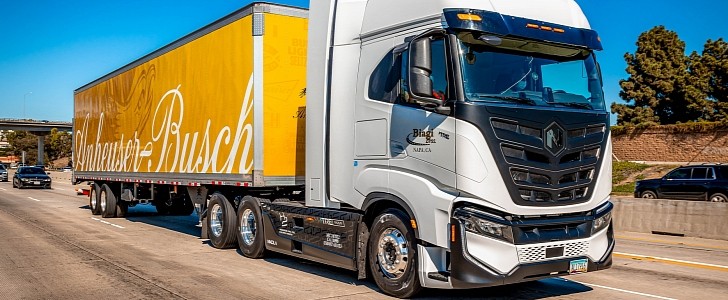Nikola officially confirmed that its two Tre FCEV alpha prototypes are with Biagi Bros. Doing that indirectly with official pictures would have been enough for us. Still, Nikola went a little further and revealed that the logistics company is actually working for Nikola's real client: Anheuser-Busch, or AB InBev. It is the world's largest brewing company is testing the fuel cell trucks by carrying the Bud Light NEXT, the first zero-carb beer.
Apparently, the Tre FCEV’s first mission was to pick the first shipment of this zero-emissions beer in Van Nuys, where AB InBev has the brewery that produces the Bud Light NEXT, and carry it to the company’s distribution center in Carson, California.
From Carson, the Bud Light NEXT was transported to local bars around Los Angeles with a BYD 8TT tractor. This is where the story gets really ironic: both Nikola and BYD were once mocked by Elon Musk. In December 2017, AB InBev ordered 40 Tesla Semi units. A bit more than four years later, the two companies are delivering beer. No Tesla Semi has been delivered so far.
To be fair, neither was the Tre FCEV. The two trucks currently operated by Biagi Bros are prototypes that will work for AB InBev for three months in the brewer’s Southern California network. The pilot program is intended to “refine the production specifications and features of the Nikola vehicles.” AB InBev also expects “to demonstrate the viability of fuel cell trucking and hydrogen refilling in beverage hauling.”
As we have already mentioned, fuel cell trucks are lighter than those with battery packs. With a lower curb weight, they have a larger payload capacity. Apart from that, a truck running on hydrogen is faster to be put to work again than one waiting to be recharged. The more a truck runs, the more money it makes. Fast charging also brings a concern: if it is performed too often, the battery pack lifespan can be reduced.
So far, it does not seem to be a problem for AB InBev’s fleet of BYD trucks. Apart from the 20 units the company already has, it is ordering 25 more. The world’s largest beverage company established its deal with Nikola in 2018.
From Carson, the Bud Light NEXT was transported to local bars around Los Angeles with a BYD 8TT tractor. This is where the story gets really ironic: both Nikola and BYD were once mocked by Elon Musk. In December 2017, AB InBev ordered 40 Tesla Semi units. A bit more than four years later, the two companies are delivering beer. No Tesla Semi has been delivered so far.
To be fair, neither was the Tre FCEV. The two trucks currently operated by Biagi Bros are prototypes that will work for AB InBev for three months in the brewer’s Southern California network. The pilot program is intended to “refine the production specifications and features of the Nikola vehicles.” AB InBev also expects “to demonstrate the viability of fuel cell trucking and hydrogen refilling in beverage hauling.”
As we have already mentioned, fuel cell trucks are lighter than those with battery packs. With a lower curb weight, they have a larger payload capacity. Apart from that, a truck running on hydrogen is faster to be put to work again than one waiting to be recharged. The more a truck runs, the more money it makes. Fast charging also brings a concern: if it is performed too often, the battery pack lifespan can be reduced.
So far, it does not seem to be a problem for AB InBev’s fleet of BYD trucks. Apart from the 20 units the company already has, it is ordering 25 more. The world’s largest beverage company established its deal with Nikola in 2018.



















